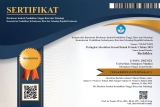THE RIGHT TO DEMOCRACY ARRANGEMENT UNDER INTERNATIONAL LAW
Abstract
In the historical context, during the Cold War, due to the tension of ideology between countries, the link between international law and the notion of democracy only received few discussions and interest by international law scholars. The fall of communism in the early 1990s has put liberal democracy - as the only legal system of government - back on the global agenda. The victory of democracy throughout the world quickly led to the claim that there is now a right to democracy in international legal instruments and the existence of democracy as a guiding principle in general international law. However, the word "democracy" does not appear in the Charter of the United Nations and in the Covenant of the League of Nations. There is no standard textbook on international law that contains chapters on democracy. The International Court of Justice does not base its decisions on applying the principles of democratic rule. If one does not look beyond the pillars of international law, one could conclude that democracy is irrelevant. In maintaining that all communities are entitled to democratic governance, this paper will examine arrangements for the right to democracy in international law, especially under the Universal Declaration of Human Rights, which is recognized by the international community.
Keywords
Full Text:
PDFReferences
Books
Bhagwati, J. N. (2002). Democracy and Development: Cruel Dilemma or Symbiotic Relationship. Review of Development Economics, Wiley Blackwell, vol. 6(2). Convention for the Protection of Human Rights and Fundamental Freedoms as amended by Protocol No. 11, Rome, 4 November 1950, http://conventions.coe.int;
Ezetah, R. (1997). The right to democracy: a qualitative inquiry. Brooklyn Journal of International Law.
Falk.R A and Strauss, A. (2000). On the Creation of a Global Peoples Assembly: Legitimacy and the Power of Popular Sovereignty. Stanford Journal of International Law 191.
Fox, J. (2007). Do Democracies Have Separation of Religion and State?. Canadian Journal of Political Science.
Held, D.(1995). Democracy and the Global Order. California: StanfordUniversity Press.
International Covenant on Civil and Political Rights, G.A. res. 2200A (XXI), 21 U.N. GAOR Supp. (No. 16) at 52, U.N. Doc. A/6316 (1966), 999 U.N.T.S.171, entered into force Mar. 23, 1976
McFaul, M. (2004) Democracy promotion as a world value, The Washington Quarterly, 28:1.
Przetacznik, F. (1991). The Basic Collective Human Right to Self Determination of Peoples and Nations as a Prerequisite for Peace. NYLS Journal of Human Rights, Vol. 8.
Recommendation 1444 (2000), Doc. 8700 of 5 April 2000, Opinion of the Committee on Legal Affairs and Human Rights, http://stars.coe.fr/doc/doc00/edoc8700.htm; and Decision of 13 January 1997, http://stars.coe.fr/act/compress/cp97/11f(97).htm.
Reisman, M. (2000). Sovereignty and Human Rights in Contemporary International Law,in Gregory Fox and Brad Roth, eds., Democratic Governance and International Law. Pp.,251-258. Cambridge: Cambridge University Press.
Russett, B. (1997). An Agenda for Peace 1995. By Boutros Boutros-Ghali. 2d ed. New York: United Nations.
Stiglitz, J. E. (2003). Globalization and its discontents. New York: W.W. Norton.
Singer, P. W. (2002). Corporate warriors: The rise of the privatized military industry. Ithaca: Cornell University Press.
Stromseth, J. E. (1992). Self-Determination, Secession and Humanitarian Intervention by the United Nations. Proceedings of the ASIL Annual Meeting.
U.N. Hum. Rts. Comm’n [HRC], General Comment No. 25: The Right to Participate inPublic Affairs, Voting Rights and the Right of Equal Access to Public Service, art. 11, U.N.Doc. CCPR/C/21/Rev.1/Add.7 (Dec. 7, 1996).
Universal Declaration of Human Rights, G.A. res. 217A (III), U.N. Doc A/810 at 71 (1948).
DOI: https://doi.org/10.21107/ri.v14i2.6248
Refbacks
- There are currently no refbacks.

Rechtidee is licensed under a Creative Commons Attribution-ShareAlike 4.0 International License.
Indexing and Abstracting:












